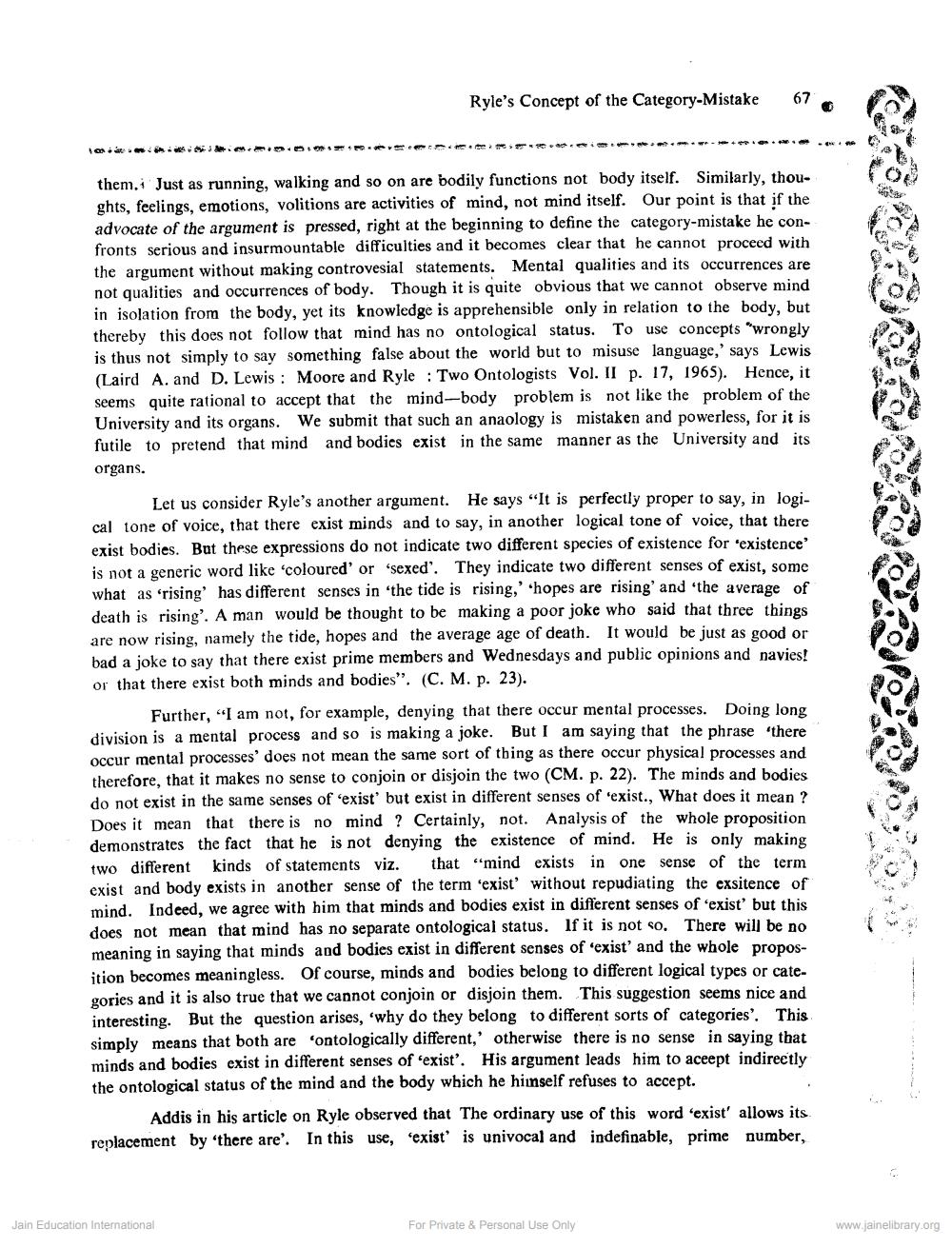________________
Ryle's Concept of the Category-Mistake
67
'09*0
them. Just as running, walking and so on are bodily functions not body itself. Similarly, thoughts, feelings, emotions, volitions are activities of mind, not mind itself. Our point is that if the advocate of the argument is pressed, right at the beginning to define the category-mistake he confronts serious and insurmountable difficulties and it becomes clear that he cannot proceed with the argument without making controvesial statements. Mental qualities and its occurrences are not qualities and occurrences of body. Though it is quite obvious that we cannot observe mind in isolation from the body, yet its knowledge is apprehensible only in relation to the body, but thereby this does not follow that mind has no ontological status. To use concepts "wrongly is thus not simply to say something false about the world but to misuse language,' says Lewis (Laird A. and D. Lewis : Moore and Ryle : Two Ontologists Vol. II p. 17, 1965). Hence, it seems quite rational to accept that the mind-body problem is not like the problem of the University and its organs. We submit that such an anaology is mistaken and powerless, for it is futile to pretend that mind and bodies exist in the same manner as the University and its organs.
Let us consider Ryle's another argument. He says "It is perfectly proper to say, in logical tone of voice, that there exist minds and to say, in another logical tone of voice, that there exist bodies. But these expressions do not indicate two different species of existence for 'existence' is not a generic word like 'coloured' or 'sexed'. They indicate two different senses of exist, some what as 'rising' has different senses in the tide is rising,' hopes are rising' and 'the average of death is rising'. A man would be thought to be making a poor joke who said that three things are now rising, namely the tide, hopes and the average age of death. It would be just as good or bad a joke to say that there exist prime members and Wednesdays and public opinions and navies! or that there exist both minds and bodies". (C. M. p. 23).
.
Further, "I am not, for example, denying that there occur mental processes. Doing long division is a mental process and so is making a joke. But I am saying that the phrase "there occur mental processes' does not mean the same sort of thing as there occur physical processes and therefore, that it makes no sense to conjoin or disjoin the two (CM. p. 22). The minds and bodies do not exist in the same senses of 'exist' but exist in different senses of 'exist., What does it mean? Does it mean that there is no mind ? Certainly, not. Analysis of the whole proposition demonstrates the fact that he is not denying the existence of mind. He is only making two different kinds of statements viz. that "mind exists in one sense of the term exist and body exists in another sense of the term 'exist without repudiating the exsitence of mind. Indeed, we agree with him that minds and bodies exist in different senses of 'exist' but this does not mean that mind has no separate ontological status. If it is not so. There will be no meaning in saying that minds and bodies exist in different senses of 'exist' and the whole proposition becomes meaningless. Of course, minds and bodies belong to different logical types or categories and it is also true that we cannot conjoin or disjoin them. This suggestion seems nice and interesting. But the question arises, 'why do they belong to different sorts of categories'. This simply means that both are 'ontologically different,' otherwise there is no sense in saying that minds and bodies exist in different senses of 'exist'. His argument leads him to aceept indirectly the ontological status of the mind and the body which he himself refuses to accept.
Addis in his article on Ryle observed that the ordinary use of this word 'exist' allows its replacement by 'there are'. In this use, 'exist' is univocal and indefinable, prime number,
Jain Education International
For Private & Personal Use Only
www.jainelibrary.org




